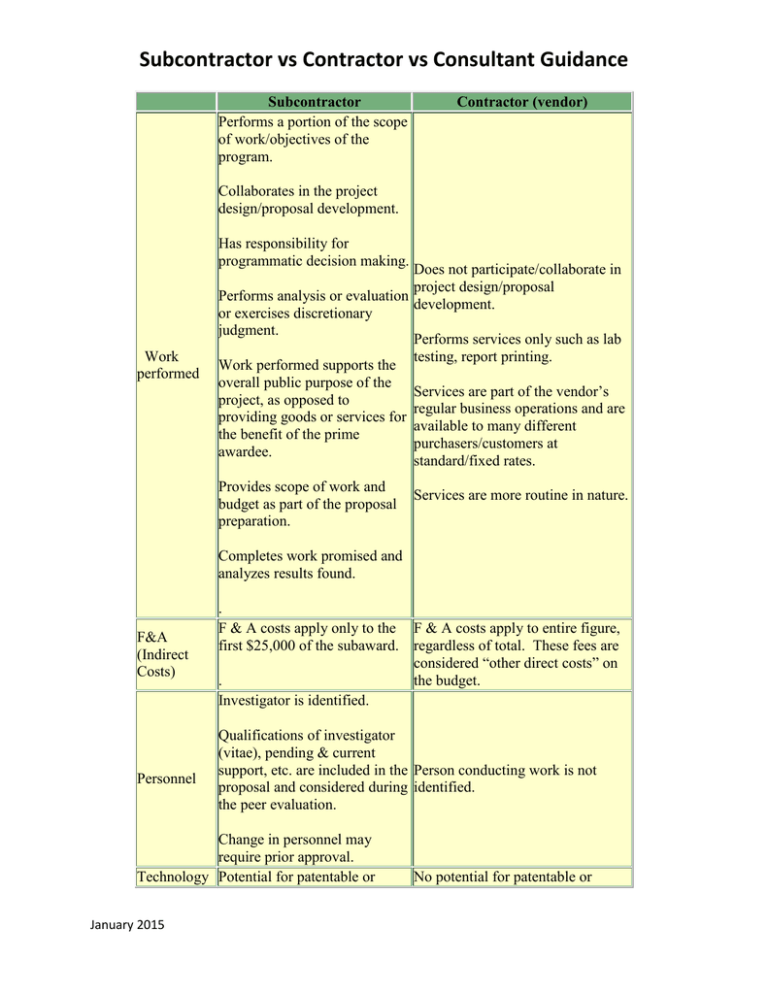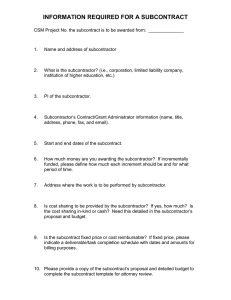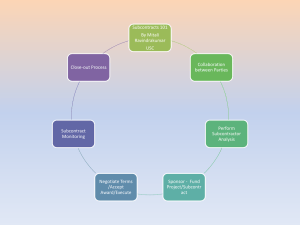Subcontractor vs Contractor vs Consultant Guidance
advertisement

Subcontractor vs Contractor vs Consultant Guidance Subcontractor Performs a portion of the scope of work/objectives of the program. Contractor (vendor) Collaborates in the project design/proposal development. Has responsibility for programmatic decision making. Work performed Does not participate/collaborate in project design/proposal Performs analysis or evaluation development. or exercises discretionary judgment. Performs services only such as lab testing, report printing. Work performed supports the overall public purpose of the Services are part of the vendor’s project, as opposed to regular business operations and are providing goods or services for available to many different the benefit of the prime purchasers/customers at awardee. standard/fixed rates. Provides scope of work and budget as part of the proposal preparation. Services are more routine in nature. Completes work promised and analyzes results found. F&A (Indirect Costs) Personnel . F & A costs apply only to the F & A costs apply to entire figure, first $25,000 of the subaward. regardless of total. These fees are considered “other direct costs” on the budget. . Investigator is identified. Qualifications of investigator (vitae), pending & current support, etc. are included in the Person conducting work is not proposal and considered during identified. the peer evaluation. Change in personnel may require prior approval. Technology Potential for patentable or January 2015 No potential for patentable or Subcontractor vs Contractor vs Consultant Guidance Transfer copyrightable technology to be copyrightable technology to be created through project; entity created through project has right to protect technology Publication of results expected; investigator to author, or be coauthor. No publications. Publications Presentations/dissemination, such as professional conferences. May include university on list of “customers” Fixed price by project/task…No May be providing cost sharing Cost Sharing cost sharing or matching funds or matching funds involved. Flow-down of prime sponsor terms and conditions, human subjects review, etc. Compliance Depending on type of agreement, financial monitoring/restrictions/audit provisions Subcontract vs. Consultant: subcontracted work is generally conducted at another institution or company, and usually has a budget for salary/fringes, supplies, etc. The sponsor requirements/terms and conditions have to be passed down to the subcontract via written agreements. Compliance also has to be monitored. A consulting agreement is generally to an individual who is not using any institutional or organizational facilities and is acting as a direct agent. He/she usually bills by the hour, by invoice, and is paid directly. Their rate includes expenses. Subcontract: A “subcontractor” may also be referred to as a subrecipient, subawardee, subgrantee. A “subcontract” may also be referred to as a subaward or subgrant For each subcontract included in a proposal, a letter of collaboration signed by the sub-contractor’s authorized representative, a detailed scope of work, budget, and budget justification must be provided to the Office of Sponsored Program before the proposal will be approved for submittal. In most cases the subcontract total budget includes both direct and F&A costs of the subawardee in the single line item on the prime institution’s proposal budget. CONSULTANTS? Consultants are experts outside the University hired to perform a service on the project for a short period of time. Consultants are not supervised by a university employee, they do not January 2015 Subcontractor vs Contractor vs Consultant Guidance supervise any university employees, they do not have use of university facilities and resources, they take on a profit/loss risk, etc. University of Colorado faculty or other institutional staff (regardless of campus affiliation) cannot be listed as paid consultants on a UCCS project. The general rule is that extra compensation (overload) may not be paid unless it is 1) work is across department lines, 2) in addition to normal duties/responsibilities, and 3) approved by the sponsoring agency. Therefore, university employees are rarely listed as paid consultants. Also, federal funds may not be used to pay federal employees for consulting. January 2015











